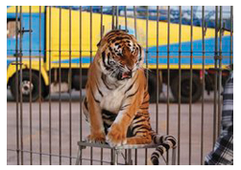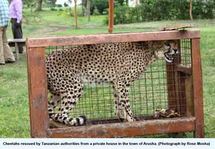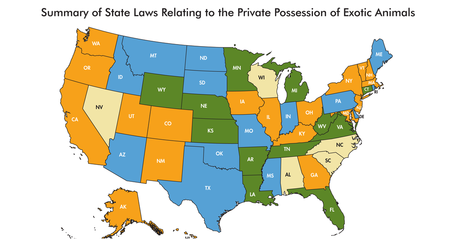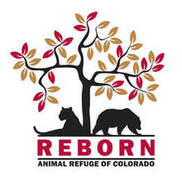EXOTIC "PETS"
It is estimated that between 5,000 and 7,000 tigers are kept as "pets", more than exist in the wild. Animals enter the exotic "pet" trade from a variety of sources. Some are stolen from their native habitat; some are "surplus" from zoos or menageries; some are sold at auctions or in pet shops; while others come from backyard breeders. The Internet has dramatically increased the ease with which people can find and purchase wild animals for their private possession.
Source: Born Free USA • www.bornfreeusa.org
Now more than ever there is a greater need for sanctuaries to care for these mistreated and discarded animals.
Source: Born Free USA • www.bornfreeusa.org
Now more than ever there is a greater need for sanctuaries to care for these mistreated and discarded animals.
19 states have a ban on private ownership of exotic animals — at least large cats (some of them ban all wild cats), wolves, bears, reptiles and most nonhuman primates: Alaska, California, Colorado, Georgia, Hawaii, Illinois, Iowa, Kentucky, Maryland, Massachusetts, New Hampshire, New Jersey, New Mexico, New York, Ohio, Oregon, Utah, Vermont, Washington
12 states have a partial ban on private ownership of exotic animals — allowing ownership of some exotic animals but precluding others: Arkansas, Connecticut, Florida, Kansas, Louisiana, Michigan, Minnesota, Nebraska, Tennessee, Virginia, West Virginia, Wyoming
14 states require the "owner" of the exotic animal to obtain a license or permit from the relevant state agency to privately possess the animal (excludes states only requiring import permits): Arizona, Delaware, Idaho, Indiana, Maine, Mississippi, Missouri, Montana, North Dakota, Oklahoma, Pennsylvania, Rhode Island, South Dakota, Texas
5 states have no license or permit requirements, but may regulate some aspect thereof (entry permit, veterinary certificate, etc.) or have no state statute governing this issue: Alabama, Nevada, North Carolina, South Carolina, Wisconsin
Updated 10/2016 - Source: Born Free USA • www.bornfreeusa.org
12 states have a partial ban on private ownership of exotic animals — allowing ownership of some exotic animals but precluding others: Arkansas, Connecticut, Florida, Kansas, Louisiana, Michigan, Minnesota, Nebraska, Tennessee, Virginia, West Virginia, Wyoming
14 states require the "owner" of the exotic animal to obtain a license or permit from the relevant state agency to privately possess the animal (excludes states only requiring import permits): Arizona, Delaware, Idaho, Indiana, Maine, Mississippi, Missouri, Montana, North Dakota, Oklahoma, Pennsylvania, Rhode Island, South Dakota, Texas
5 states have no license or permit requirements, but may regulate some aspect thereof (entry permit, veterinary certificate, etc.) or have no state statute governing this issue: Alabama, Nevada, North Carolina, South Carolina, Wisconsin
Updated 10/2016 - Source: Born Free USA • www.bornfreeusa.org
CIRCUSES

While circus promoters claim that trainers use only positive reinforcement, or rewards, reports prove otherwise. Circus training methods include beating animals with clubs and other objects and depriving them of food. Trainers sometimes strike elephants with sharpened hooks, which can result in physical injury. Trainers resort to brutal methods to try to maintain a position of dominance.
Source: The true cruelty under the big top • www.humanesociety.org
More and more people are becoming aware of how circus life for any animal is cruel and unnatural. Reborn wants to help stop the suffering and you can help too. Please support, The Traveling Exotic Animal and Public Safety Protection Act (TEAPSPA). By clicking on the link below you can find out how to contact your Senators and Representatives today in
Support of TEAPSPA
You can also support our mission of helping the animals we are working to save by donating today, thank you for your support.
Source: The true cruelty under the big top • www.humanesociety.org
More and more people are becoming aware of how circus life for any animal is cruel and unnatural. Reborn wants to help stop the suffering and you can help too. Please support, The Traveling Exotic Animal and Public Safety Protection Act (TEAPSPA). By clicking on the link below you can find out how to contact your Senators and Representatives today in
Support of TEAPSPA
You can also support our mission of helping the animals we are working to save by donating today, thank you for your support.
WILDLIFE TRADE

Wildlife trade is perhaps the most immediate threat to animals in many parts of the world. Around the globe, wildlife is being bought and sold on an increasingly massive scale as pets, meat, and food, as medicine, furs, feathers, skins, and trophies. You can help make a difference just by being aware of your purchases, ask yourself these questions before you buy:
Every wildlife organization, sanctuary, and people like you, need to work together and support each other for the greater cause. We encourage you to learn as much as you can about these issues we have shared with you and share your passion with friends and family. We encourage education about important animal issues; speak up for the animals, volunteer to help, be kind to all animals, and make educated decisions with your purchases and organizations you visit.
- What is this product made of?
- Where did this product come from?
- Does the country I’m visiting allow the sale and export of this product?
- Do I need permits or other documents from this country or the US to take this item home?
Every wildlife organization, sanctuary, and people like you, need to work together and support each other for the greater cause. We encourage you to learn as much as you can about these issues we have shared with you and share your passion with friends and family. We encourage education about important animal issues; speak up for the animals, volunteer to help, be kind to all animals, and make educated decisions with your purchases and organizations you visit.
More information
Want to know more about animal laws and guidelines? Check out the USDA's Animal Welfare Information Center (AWIC) for state, local, federal, and international laws and regulations, in addition to information on animals used in research, testing, teaching, and exhibition.
We exist because of the dark side of humanity
We persist because of the good side of humanity
We persist because of the good side of humanity


